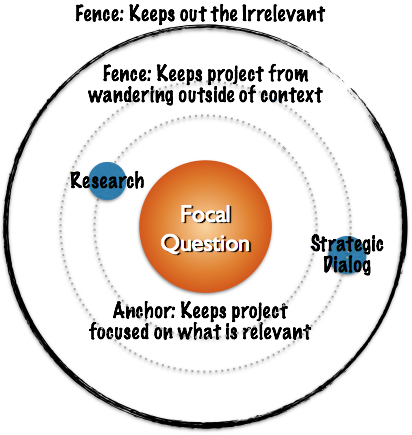The focal question in scenario planning acts as an anchor and as a fence. It anchors the project so that people are clear about what they are solving for. “The future of learning” will pull in dialog about learning, acting like gravity, placing appropriate ideas, concepts and evidence in orbit, while material not related to the question floats off.
Focal question as anchor
Focal questions need to be precise, but they also need to be bigger than any other question on the table. “What will learning look like in 2030?” for instance, is bigger than the “future of education” because it doesn’t presume education as the only means of learning. This opens up the conversation to self-motivated learners, just-in-time learners, corporate training and professional development, and a wide range of other topics.
“The future of learning” is also much bigger than “what will our <insert your institution’s name> look like in 2030.” The broader question opens up the dialog to the general uncertainties and forces shaping learning, that may also reshape the institution. If the institution becomes the focus, then research and perspectives are likely to miss bigger forces that may take the institution in directions it doesn’t foresee regardless of what it wants to be. This type of project become overly self-reflective and tends to act like an echo chamber. Scenario projects should create context that allow for the exploration of big influences everyone sees, and for weak signals that may grow in their influence as time progresses.
It is important to note that the focal question needs to be broad, but that the scenarios themselves, once developed, can easily act as the foundation for exploring what an institution or any other concept might be in the future. But rather than creating the anchor and pulling the fence in close, the broader context creates room where the smaller ideas may interestingly roam.
Focal question as fence
And speaking of fences, the focal question acts as a fence in that a project around learning should not explore ideas related to asteroid mining or the productivity of global agriculture. Those topics may show up as learning opportunities for which learners need to acquire skills, but the research won’t dive into the politics, economics or science on either topic, though both of those topics are ripe for their own scenario work.
““The future of learning” is also much bigger than “what will our <insert your institution’s name> look like in 2030.” The broader question opens up the dialog to the general uncertainties and forces shaping learning.”
As a fence, the focal question creates the basis for context. The focal question keeps the dialog relevant to the problem space and stops project members from wandering into places that don’t really concern the question on the table (no matter how interesting they may be in their own right).
The focal question also acts as fence for the project, reminding people that scenario planning is not a tool to feed “analysis paralysis,” but a decision making tool designed to help organizations obtain better outcomes by more robustly exploring what could be, and the factors of influence in the future, before making long-range decisions with strategic impact.
Focal question tips
Focal questions should follow the following rules:
- Focal questions should be short (only a few words).
- Focal questions should create a context for the solution space the client wants to explore.
- Focal questions should be phrased to explore long-range consequences of change.
- Focal questions should define time and space dimensions (the focal question, “What will learning look like in 2030” presume a global space context, but “What will learning look like in America in 2030” would also be a valid focal question.)
Focal questions should typically fall into one or more of following categories (note that the last two in the list can also be outcomes of any of the previous items):
- Decisions that need to be made (should we or shouldn’t we)
- Strategic choices
- The region
- The organization
- The city, division, function, technology or other smaller units
- Challenge assumptions about mission and vision
- Explore for learning
- Professional development in strategic thinking
- Team building


